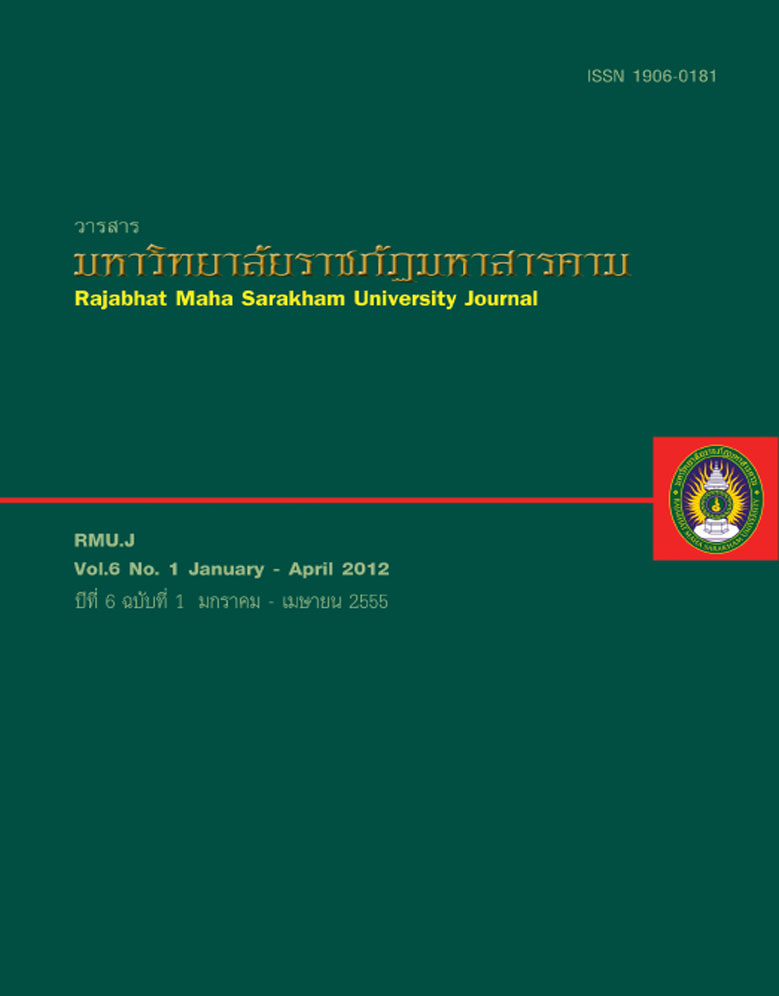ผลการจัดกิจกรรมการเรียนรู้คณิตศาสตร์ตามแนวคิดทฤษฎีคอนสตรัคติวิสต์ เพื่อพัฒนาทักษะกระบวนการแก้ปัญหา เรื่อง พื้นที่ ชั้นประถมศึกษาปีที่ 4;Results of Conducting Mathematical Learning Activities Based on the Constructivist Theory for Developing Problem Solvin
Main Article Content
บทคัดย่อ
การวิจัยครั้งนี้มีวัตถุประสงค์ ประการแรก เพื่อศึกษาผลการจัดกิจกรรมการเรียนรู้คณิตศาสตร์ตามแนวคิดทฤษฎีคอนสตรัคติ
วิสต์ เรื่อง พื้นที่ ชั้นประถมศึกษาปีที่ 4 ประการที่สอง เพื่อพัฒนาทักษะกระบวนการแก้ปัญหา ประการที่สาม เพื่อพัฒนาผลสัมฤทธิ์
ทางการเรียนวิชาคณิตศาสตร์ เรื่อง พื้นที่ ชั้นประถมศึกษาปีที่ 4 กลุ่มเป ้าหมาย ได้แก่ นักเรียน ชั้นประถมศึกษาปีที่ 4 โรงเรียนชุมชน
บ้านโพธิ์สองห้องวิทยา สำนักงานเขตพื้นที่การศึกษามหาสารคาม เขต 2 ภาคเรียนที่ 2 ปีการศึกษา 2552 จำนวน 23 คน รูปแบบ
การวิจัยใช้การวิจัยเชิงปฏิบัติการ มีวงจรการปฏิบัติ 4 วงจร คือ วงจรปฏิบัติการที่ 1 ประกอบด้วยแผนการจัดการเรียนรู้ที่ 1-4 วงจร
ปฏิบัติการที่ 2 ประกอบด้วยแผนการจัดการเรียนรู้ที่ 5-6 วงจรปฏิบัติการที่ 3 ประกอบด้วยแผนการจัดการเรียนรู้ที่ 7-9วงจรปฏิบัติ
การที่ 4 ประกอบด้วยแผนการจัดการเรียนรู้ที่10-12 เครื่องมือที่ใช้ในการวิจัย แบ่งเป็น 3 ประเภท ได้แก่ 1) เครื่องมือที่ใช้ในการจัด
กิจกรรมคือแผนการจัดการเรียนรู้ตามแนวคิดทฤษฎีคอนสตรัคติวิสต์ เรื่อง พื้นที่ ชั้นประถมศึกษาปีที่4 จำนวน 12 แผน ใช้เวลาแผน
ละ 1 ชั่วโมง 2) เครื่องมือที่ใช้ในการสะท้อนผลการปฏิบัติ ได้แก่ แบบบันทึกการสังเกตพฤติกรรมการสอนของครู แบบบันทึกผลหลัง
การจัดกิจกรรมการเรียนรู้ บัตรกิจกรรมรายบุคคล บัตรกิจกรรมกลุ่ม แบบฝึกทักษะ แบบสัมภาษณ์นักเรียน แบบทดสอบท้ายวงจร
และ 3) เครื่องมือที่ใช้ในการวัดและประเมินประสิทธิภาพการจัดกิจกรรมการเรียนรู้ คือ แบบทดสอบวัดผลสัมฤทธิ์ทางการเรียน เรื่อง
พื้นที่ ชั้นประถมศึกษาปีที่ 4 เป็นแบบปรนัยชนิดเลือกตอบ 4 ตัวเลือก จำนวน 30 ข้อ มีค่าอำนาจจำแนกรายข้อ(B) ตั้งแต่ 0.24 ถึง
0.87 มีค่าความเชื่อมั่นทั้งฉบับ (rcc) เท่ากับ 0.64และแบบทดสอบวัดทักษะกระบวนการแก้ปัญหามีค่าความเชื่อมั่นโดยหาสัมประสิทธิ์
สหสัมพันธ์ (rxy) มีค่าเท่ากับ 0.80 ผลการวิจัยพบว่า
1. กิจกรรมการเรียนรู้คณิตศาสตร์ตามแนวคิดทฤษฎีคอนสตรัคติวิสต์เพื่อพัฒนาทักษะกระบวนการแกป้ ญั หาเรื่อง พื้นที่ชั้น
ประถมศึกษาปีที่ 4 มี 4 ขั้นตอน 1) ขั้นนำ เป็นการสร้างแรงจูงใจให้เกิดกับนักเรียนโดยใช้ เพลง เกม และทบทวนความรู้เดิมการใช้
คำถามถามตอบ ทำให้นักเรียนมีความพร้อมที่จะเข้าสู่กระบวนการจัดกิจกรรมการเรียนรู้ 2) ขั้นกระบวนการจัดกิจกรรมการเรียนรู้
ประกอบด้วย 3 ขั้น ได้แก่ 1. ขั้นเผชิญสถานการณ์ปัญหาและแก้ปัญหาเป็นรายบุคคล 2. ขั้นไตร่ตรองระดับกลุ่ม 3. ขั้นเสนอแนวทาง แก้
ปัญหาต่อชั้นเรียน 3) ขั้นสรุป นักเรียนร่วมกันสรุปโดยการนำเสนอผลงานเพื่อให้เกิดมโนมติและวิธีแก้ปัญหาที่ถูกต้อง 4) ขั้นฝึกทักษะ
ในขั้นนี้นักเรียนได้ฝึกทักษะจากแบบฝึกทักษะที่ผู้วิจัยสร้างขึ้น ผลการทดสอบท้ายวงจรที่ 1 คะแนนเฉลี่ยทั้งชั้นเท่ากับ 11.26 คะแนน
คิดเป็นร้อยละ 75.07 ค่าเบี่ยงเบนมาตรฐานเท่ากับ 1.14 จำนวนนักเรียนผ่านเกณฑ์ 18 คน คิดเป็นร้อยละ 78.26 ของนักเรียนทั้งหมด
วงจรที่ 2 คะแนนเฉลี่ยทั้งชั้นเท่ากับ 11.91 คะแนนคิดเป็นร้อยละ 78.53 ค่าเบี่ยงเบนมาตรฐานเท่ากับ 1.31 จำนวนนักเรียนผ่าน
เกณฑ์ 19 คน คิดเป็นร้อยละ 82.61 ของนักเรียนทั้งหมด วงจรที่ 3 คะแนนเฉลี่ยทั้งชั้นเท่ากับ 12.13 คะแนนคิดเป็นร้อยละ 80.87
ค่าเบี่ยงเบนมาตรฐานเท่ากับ 1.18 จำนวนนักเรียนผ่านเกณฑ์ 21 คน คิดเป็นร้อยละ 91.30 ของนักเรียนทั้งหมด วงจรที่ 4 คะแนน
เฉลี่ยทั้งชั้นเท่ากับ 12.35 คะแนนคิดเป็นร้อยละ 82.33 ค่าเบี่ยงเบนมาตรฐานเท่ากับ 0.83 จำนวนนักเรียนผ่านเกณฑ์ 23 คน คิดเป็น
ร้อยละ 100 ของนักเรียนทั้งหมด
2. ผลการเรียนด้านทักษะกระบวนการแก้ปัญหา เรื่อง พื้นที่ ชั้นประถมศึกษาปีที่ 4 คะแนนเฉลี่ยทั้งชั้นเท่ากับ 15.75 คิดเป็นร้อยละ
78.70 จำนวนนักเรียนที่ผ่านเกณฑ์ 21 คน คิดเป็นร้อยละ 91.30
3. ผลสัมฤทธิ์ทางการเรียน คะแนนเฉลี่ยทั้งชั้นเท่ากับ 22.78 คิดเป็นร้อยละ 75.93 จำนวนนักเรียนที่ผ่านเกณฑ์ 20 คน คิดเป็น
ร้อยละ 86.97
The objectives of this study were to 1) study the results of conducting mathematical learning activities
based on the constructivist theory on the topic ‘Area’ for fourth graders, 2) develop the students’ problem
solving skills, and 3) develop fourth graders’ mathematical learning achievement on this topic. The target
group of 23 students were fourth graders of BanPhoSonghong Community School under the Office of Mahasarakham
Educational Area 2 studying in the second semester of the 2009 academic year. The study
made use of action research with four spirals: Spiral 1 consisted of instructional plans 1-4, Spiral 2 consisted
of plans 5-6, Spiral 3 consisted of plans 7-9, and Spiral 4 consisted of instructional plans 10-12. The following
three types of research instruments were used in this action research: 1) instruments for conducting
learning activities --- that is, 12 instructional plans based on the constructivist theory on the topic ‘Area’; 2)
Reflection instruments--- teaching behavior observation form, post-learning record form, individual activity
cards, group activity cards, skill practice form, student interview form, and post- test after each spiral;
and 3) Learning Activities Achievement Assessment instrument--- a 30-item 4-choice achievement test with
discrimination power of 0.24 to 0.87 and 0.64 reliability, and the test of problem solving skills with 0.80 reliability.
Mean, Standard Deviation and Percentage were used for quantitative data analysis. The qualitative
data were descriptively analyzed based on content analysis from observation forms.
Research findings are as follows:1. The mathematical learning activities based on the constructivist theory on the topic ‘Area’ for fourth
graders consisted of 1) Leading Stage: building up students’ motivation with songs, games, review of previous
knowledge, and questions & answers; 2) Learning Activities Stage: consisting of (1) facing problems
situation and individual problem solving, (2) Thinking over at the group level and (3) presenting problem
solutions; 3) Conclusion Stage: students summarizing by presenting results for conceptual thinking and
appropriate problem solving strategies; and 4) Skill Training Stage with students practice based on the
constructed skill-training package. The test result after spiral 1 revealed group mean of 11.26 or 75.07 % ,
S.D.=1.14 with 18 students or 78.26 % passing the criteria. The test result after spiral 2 showed the group mean of 11.91 or 78.53 % , S.D.=1.31 with 19 students or 82.61 % passing the criteria. For spiral 3 the
group mean was 12.13 or 80.87 % , S.D.=1.18 with 21 students or 91.30 % passing; and the result of spiral
4 showed the group mean of 12.35 or 82.33 % , S.D.=0.83 with 23 students or 100 % of the total number
passing the criteria.
2. Regarding problem solving skills on the topic ‘Area’, the class mean was 15.75 or 78.70 %, S.D.=1.36
with 21 students or 91.30 % of the total passing the criteria.
3. The students’ mean score of the achievement test was 22.78 or 75.93 %, which was higher than the
established criteria of 70 %, with 20 students or 86.97 % of the total passing the criteria.
Article Details
1. บทความที่ลงตีพิมพ์ทุกเรื่องได้รับการตรวจทางวิชาการโดยผู้ประเมินอิสระ ผู้ทรงคุณวุฒิ (Peer Review) สาขาที่เกี่ยวข้อง อย่างน้อย 3 ท่าน ในรูปแบบ Double blind review
2. ข้อคิดเห็นใด ๆ ของบทความที่ลงตีพิมพ์ในวารสารมหาวิทยาลัยราชภัฏมหาสารคาม นี้เป็นของผู้เขียน คณะผู้จัดทำวารสารไม่จำเป็นต้องเห็นด้วย
3. กองบรรณาธิการวารสารมหาวิทยาลัยราชภัฏมหาสารคาม ไม่สงวนสิทธิ์การคัดลอกแต่ให้อ้างอิงแสดงที่มา


